八年级英语一般将来时讲解
- 格式:docx
- 大小:12.45 KB
- 文档页数:7
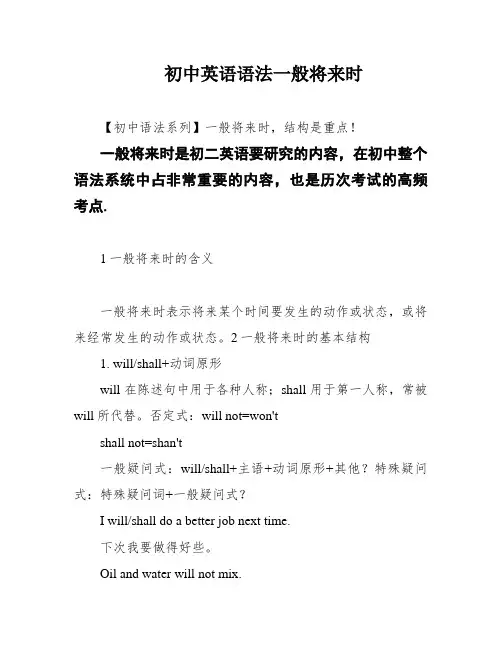
初中英语语法一般将来时【初中语法系列】一般将来时,结构是重点!一般将来时是初二英语要研究的内容,在初中整个语法系统中占非常重要的内容,也是历次考试的高频考点.1一般将来时的含义一般将来时表示将来某个时间要发生的动作或状态,或将来经常发生的动作或状态。
2一般将来时的基本结构1. will/shall+动词原形will在陈述句中用于各种人称;shall用于第一人称,常被will所代替。
否定式:will not=won'tshall not=shan't一般疑问式:will/shall+主语+动词原形+其他?特殊疑问式:特殊疑问词+一般疑问式?I will/shall do a better job next time.下次我要做得好些。
Oil and water will not mix.油和水没法混在一起。
—Will he help you with your English tonight?今天晚上他会帮助你研究英语吗?—Yes, he will./No, he won't.是的,他会。
/不,他不会。
—When will you arrive for America?你什么时候去美国?—Tomorrow.来日诰日。
2. am/is/are going to +动词原形否认式:am/is/are not going to +动词真相普通疑问式:am/is/are +主语+ going to +动词真相+其他?特殊疑问式:特殊疑问词+普通疑问式?He is going to spend his holidays in London.他打算在伦敦度假。
Look at the dark clouds. There is going to be a storm.看那乌云,快要下雨了。
Is he going to collect any data for us?他会帮我们搜集数据吗?What are you going to do tomorrow?明天你打算作什么?3will+动词原形与am/is/are going to +动词原形的用法区别will+动词原形与am/is/are going to +动词原形的用法虽然都表示将来发生动作或情况,一般情况下能互换。
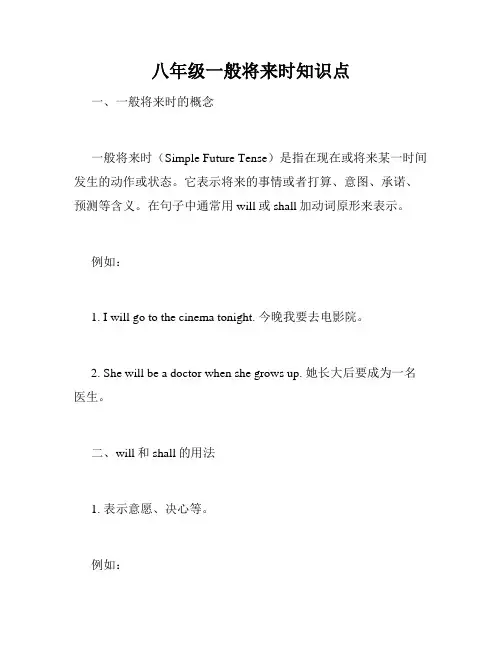
八年级一般将来时知识点一、一般将来时的概念一般将来时(Simple Future Tense)是指在现在或将来某一时间发生的动作或状态。
它表示将来的事情或者打算、意图、承诺、预测等含义。
在句子中通常用will或shall加动词原形来表示。
例如:1. I will go to the cinema tonight. 今晚我要去电影院。
2. She will be a doctor when she grows up. 她长大后要成为一名医生。
二、will和shall的用法1. 表示意愿、决心等。
例如:I will help you with your homework.我会帮你做作业。
2. 表示承诺或提议等用法。
例如:I shall be there on time.我会准时到那儿。
Shall we go to the park tomorrow?我们明天去公园好吗?3. 在口语中,will常用于表示将来事件。
例如:It will rain tomorrow.明天会下雨。
4. shall在现代英语中已经不常用,一般只在特殊疑问句或回答中使用。
例如:Shall I open the window?我该打开窗户吗?Yes, you shall.是的,你该打开。
三、构成方法形式:will / shall + 动词原形例如:I will go to Paris next month. 下个月我要去巴黎。
He shall be here soon. 他马上就要来了。
注意:一般将来时中,主语部分要与will或shall连用,不可以出现be动词或助动词do/does/did等。
四、常用的表示将来的时间状语1. tomorrow 明天例如:She will be back tomorrow. 她明天回来。
2. next week/month/year 下周/月/年例如:We will visit them next month. 我们下个月去探望他们。
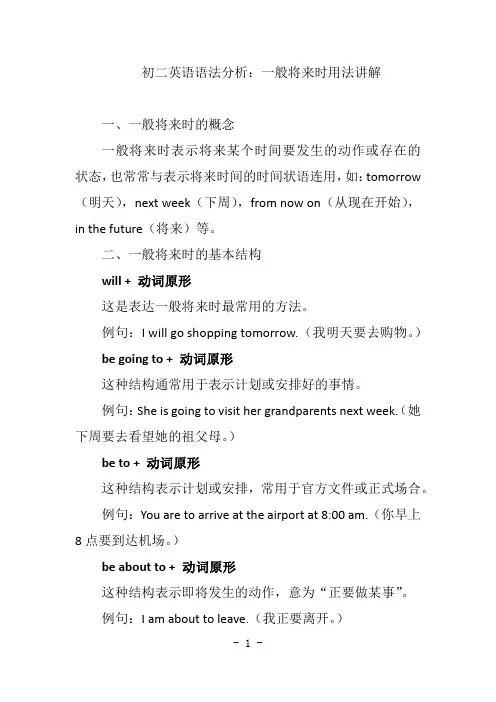
初二英语语法分析:一般将来时用法讲解一、一般将来时的概念一般将来时表示将来某个时间要发生的动作或存在的状态,也常常与表示将来时间的时间状语连用,如:tomorrow (明天),next week(下周),from now on(从现在开始),in the future(将来)等。
二、一般将来时的基本结构will + 动词原形这是表达一般将来时最常用的方法。
例句:I will go shopping tomorrow.(我明天要去购物。
)be going to + 动词原形这种结构通常用于表示计划或安排好的事情。
例句:She is going to visit her grandparents next week.(她下周要去看望她的祖父母。
)be to + 动词原形这种结构表示计划或安排,常用于官方文件或正式场合。
例句:You are to arrive at the airport at 8:00 am.(你早上8点要到达机场。
)be about to + 动词原形这种结构表示即将发生的动作,意为“正要做某事”。
例句:I am about to leave.(我正要离开。
)be due to + 动词原形这种结构表示某事预定或预期将要发生。
例句:The train is due to arrive at 5:00 pm.(火车预定下午5点到达。
)三、一般将来时的用法1表示将来的动作或状态例句:I will buy a new car next year.(明年我要买一辆新车。
)2表示将来的计划或安排例句:We are going to have a picnic this weekend.(我们这个周末要去野餐。
)3表示根据现有情况推测未来的可能性例句:It's going to rain soon.(很快就要下雨了。
)4表示命令、请求、建议等例句:You are to finish your homework before you go out.(你出去之前要把作业做完。
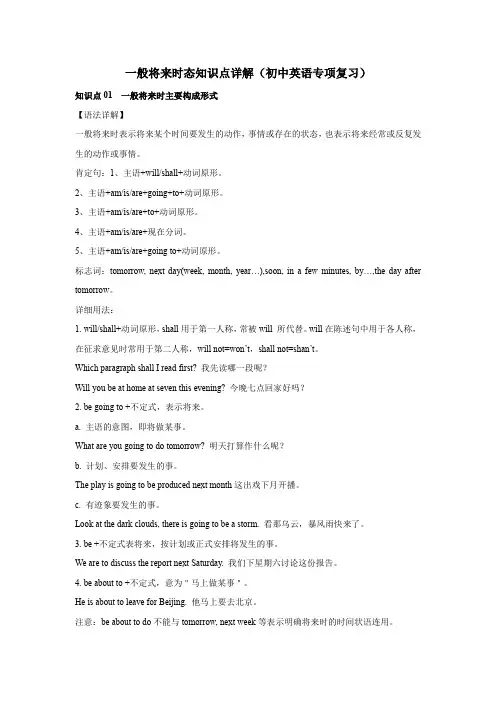
一般将来时态知识点详解(初中英语专项复习)知识点01 一般将来时主要构成形式【语法详解】一般将来时表示将来某个时间要发生的动作,事情或存在的状态,也表示将来经常或反复发生的动作或事情。
肯定句:1、主语+will/shall+动词原形。
2、主语+am/is/are+going+to+动词原形。
3、主语+am/is/are+to+动词原形。
4、主语+am/is/are+现在分词。
5、主语+am/is/are+going to+动词原形。
标志词:tomorrow, next day(week, month, year…),soon, in a few minutes, by…,the day after tomorrow。
详细用法:1. will/shall+动词原形,shall用于第一人称,常被will 所代替。
will在陈述句中用于各人称,在征求意见时常用于第二人称,will not=won’t,shall not=shan’t。
Which paragraph shall I read first? 我先读哪一段呢?Will you be at home at seven this evening? 今晚七点回家好吗?2. be going to +不定式,表示将来。
a. 主语的意图,即将做某事。
What are you going to do tomorrow? 明天打算作什么呢?b. 计划、安排要发生的事。
The play is going to be produced next month这出戏下月开播。
c. 有迹象要发生的事。
Look at the dark clouds, there is going to be a storm. 看那乌云,暴风雨快来了。
3. be +不定式表将来,按计划或正式安排将发生的事。
We are to discuss the report next Saturday. 我们下星期六讨论这份报告。
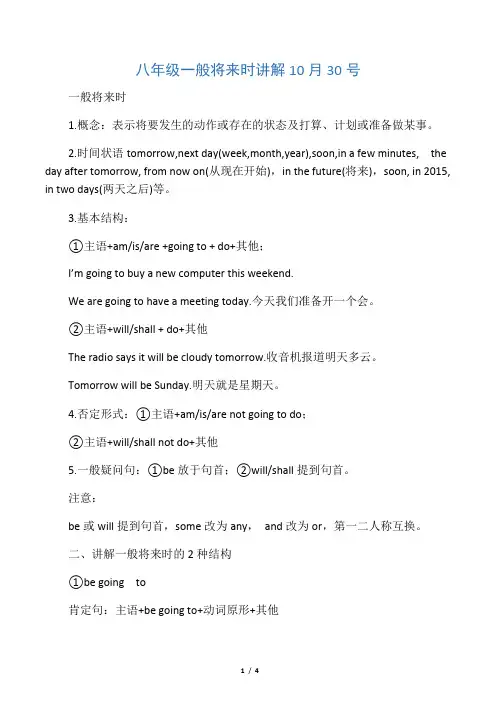
八年级一般将来时讲解10月30号一般将来时1.概念:表示将要发生的动作或存在的状态及打算、计划或准备做某事。
2.时间状语tomorrow,next day(week,month,year),soon,in a few minutes, the day after tomorrow, from now on(从现在开始),in the future(将来),soon, in 2015, in two days(两天之后)等。
3.基本结构:①主语+am/is/are +going to + do+其他;I’m going to buy a new computer this weekend.We are going to have a meeting today.今天我们准备开一个会。
②主语+will/shall + do+其他The radio says it will be cloudy tomorrow.收音机报道明天多云。
Tomorrow will be Sunday.明天就是星期天。
4.否定形式:①主语+am/is/are not going to do;②主语+will/shall not do+其他5.一般疑问句:①be放于句首;②will/shall提到句首。
注意:be或will提到句首,some改为any,and改为or,第一二人称互换。
二、讲解一般将来时的2种结构①be going to肯定句:主语+be going to+动词原形+其他I’m going to visit the Summer Palace next week.否定句:主语+be+not+going to+动词原形+其他I’m not going to visit the Summer Palace next week.一般疑问句:Be+主语+going to+动词原形+其他?Are you going to visit the Summer palace next week?特殊疑问句:特殊疑问词+be+主语+going+to+动词原形+其他?Where are you going to visit next week?1.这种结构表示主体现在打算在最近或将来要做某事。
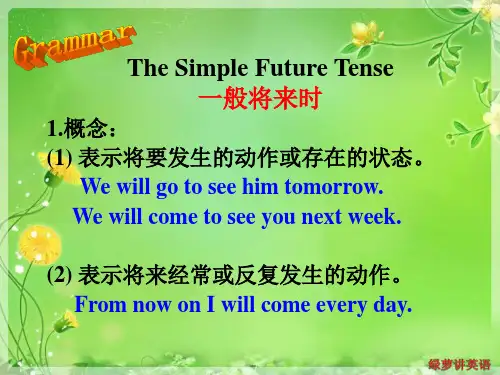
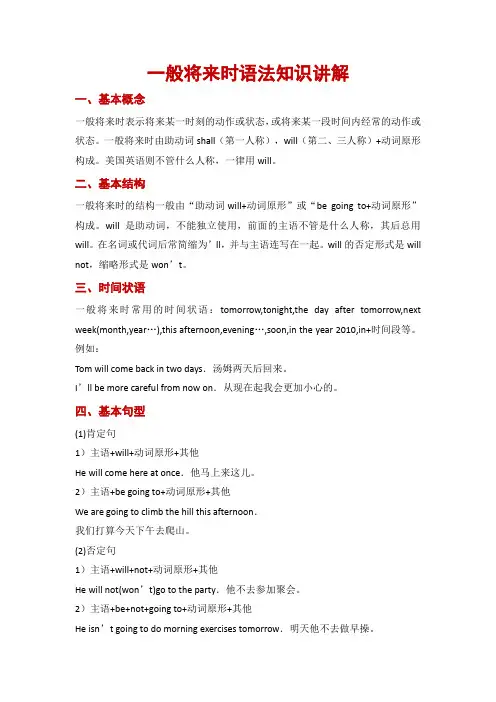
一般将来时语法知识讲解一、基本概念一般将来时表示将来某一时刻的动作或状态,或将来某一段时间内经常的动作或状态。
一般将来时由助动词shall(第一人称),will(第二、三人称)+动词原形构成。
美国英语则不管什么人称,一律用will。
二、基本结构一般将来时的结构一般由“助动词will+动词原形”或“be going to+动词原形”构成。
will是助动词,不能独立使用,前面的主语不管是什么人称,其后总用will。
在名词或代词后常简缩为’ll,并与主语连写在一起。
will的否定形式是will not,缩略形式是won’t。
三、时间状语一般将来时常用的时间状语:tomorrow,tonight,the day after tomorrow,next week(month,year…),this afternoon,evening…,soon,in the year 2010,in+时间段等。
例如:Tom will come back in two days.汤姆两天后回来。
I’ll be more careful from now on.从现在起我会更加小心的。
四、基本句型(1)肯定句1)主语+will+动词原形+其他He will come here at once.他马上来这儿。
2)主语+be going to+动词原形+其他We are going to climb the hill this afternoon.我们打算今天下午去爬山。
(2)否定句1)主语+will+not+动词原形+其他He will not(won’t)go to the party.他不去参加聚会。
2)主语+be+not+going to+动词原形+其他He isn’t going to do morning exercises tomorrow.明天他不去做早操。
(3)一般疑问句1)Will+主语+动词原形+其他?Will he help you with your English?他会帮助你学习英语吗?2)Be动词(Am,Is,Are)+主语+going to+动词原形+其他?Are you going to play computer games tomorrow afternoon?你打算明天下午玩电脑游戏吗?(4)特殊疑问句:疑问词+一般疑问句?—What will the students have for lunch today?学生们今天午饭吃什么?—They will have bread.他们将吃面包。

一般将来时讲解一般将来时讲解一般将来时:一、一般将来时的定义:一般将来时表示将来某一时刻的动作或状态,或将来某一段时间内经常的动作或状态。
常常和表示将来的时间状语连用。
如:tomorrow(明天),next week (下周);in the future(将来)等。
一般将来时由助动词shall(第一人称),will(第二、三人称)动词原形构成。
美式英语则不管什么人称,一律用will。
或用主语+be动词+ going to 动词.二、一般将来时表示方法:1.用will或shall表示“助动词will或shall+动词原形”这一形式,表示将来发生的事情,用于征求对方的意见或表示客气的邀请。
在口语中will用于所有人称,书面语中第一人称常用shall【其实will也可以用到】。
如:①Tomorrow will be Sunday. 明天就是星期天。
②The rain will stop soon. 雨很快就要停了。
③Shall we go there at five? 我们五点钟去那儿?4④Will you please open the door? 请你把门打开?2.用be going to结构表示"be going to+动词原形”用来表示事先考虑过的将要发生的动作以及已有迹象表明必将要发生的某事(有一个先兆),意为“打算;就要”。
如:①We're going to meet outside the school gate. 我们打算在校门口见面。
②Look! It's going to rain. 瞧!快下雨了。
3.用现在进行时表示表示位置转移的动词(如:go, come, leave, start, arrive等),可用现在进行时4.表示将来时。
如:①Uncle Wang is coming. 王叔叔就要来了。
②They're leaving for Beijing. 他们即将前往北京。
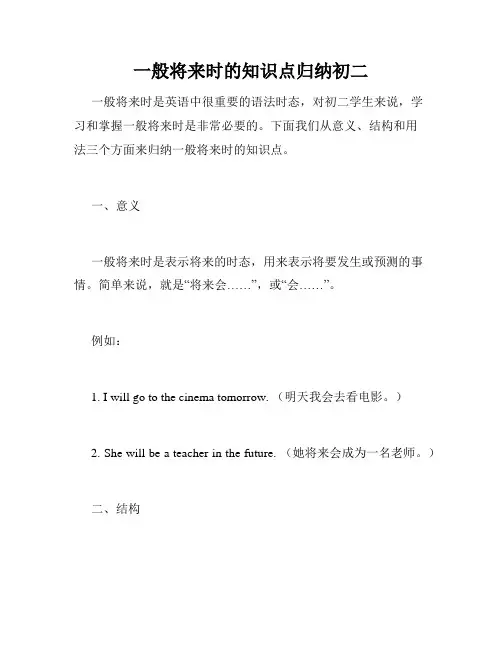
一般将来时的知识点归纳初二一般将来时是英语中很重要的语法时态,对初二学生来说,学习和掌握一般将来时是非常必要的。
下面我们从意义、结构和用法三个方面来归纳一般将来时的知识点。
一、意义一般将来时是表示将来的时态,用来表示将要发生或预测的事情。
简单来说,就是“将来会……”,或“会……”。
例如:1. I will go to the cinema tomorrow. (明天我会去看电影。
)2. She will be a teacher in the future. (她将来会成为一名老师。
)二、结构一般将来时的结构非常简单,只需要加上助动词“will”,然后加上动词的原形即可。
例如:I will study English at university.(我将会在大学里学英语。
)但是,动词“be”在将来时的形式是“will be”,比如:I will be happy. (我将会很开心。
)三、用法1. 表示将来发生的动作或事件例如:I will go to the party tonight. (今晚我会去参加派对。
)2. 表示将来的打算或意图例如:I will write a novel next year. (我明年打算写一本小说。
)3. 表示推测或预测例如:It will snow tomorrow. (明天会下雪。
)4. 表示请求例如:Will you help me with my homework, please? (请你帮帮我做作业好吗?)总之,初二学生需要掌握一般将来时,以便准确表达自己的想法和意图,也能听懂别人的语言表达。
同时,需要注意时态的正确运用,避免错误的表达和误解。
能够熟练掌握和灵活运用一般将来时,一定会为日后的英语学习打下坚实的基础。
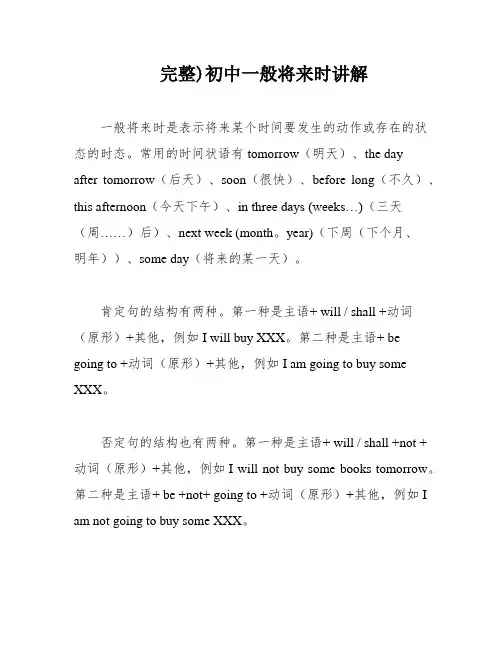
完整)初中一般将来时讲解一般将来时是表示将来某个时间要发生的动作或存在的状态的时态。
常用的时间状语有tomorrow(明天)、the dayafter tomorrow(后天)、soon(很快)、before long(不久)、this afternoon(今天下午)、in three days (weeks…)(三天(周……)后)、next week (month。
year)(下周(下个月、明年))、some day(将来的某一天)。
肯定句的结构有两种。
第一种是主语+ will / shall +动词(原形)+其他,例如I will buy XXX。
第二种是主语+ be going to +动词(原形)+其他,例如I am going to buy some XXX。
否定句的结构也有两种。
第一种是主语+ will / shall +not +动词(原形)+其他,例如I will not buy some books tomorrow。
第二种是主语+ be +not+ going to +动词(原形)+其他,例如I am not going to buy some XXX。
疑问句的结构也很简单。
第一种是Will / Shall +主语+动词原形+其他…?例如XXX?第二种是Be +主语+going to +动词原形+其他…?例如Are you going to buy some books tomorrow?肯定回答有两种方式。
第一种是Yes,主语+will,例如Yes。
I will。
第二种是Yes,主语+ be,例如Yes。
I am。
否定回答也有两种方式。
第一种是No,主语+will +not,例如No。
I will not。
第二种是No,主语+be + not,例如No。
I am not。
除了一般将来时,还有其他表示将来的时态,如be going to、be to(高中)、be about to(初中)。
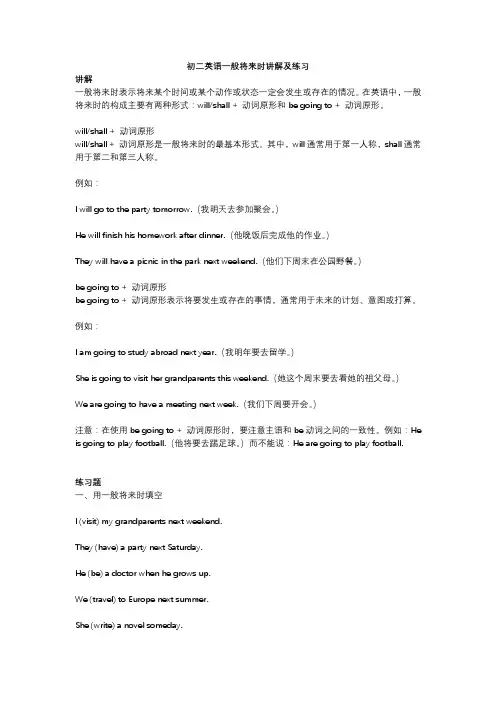
初二英语一般将来时讲解及练习讲解一般将来时表示将来某个时间或某个动作或状态一定会发生或存在的情况。
在英语中,一般将来时的构成主要有两种形式:will/shall + 动词原形和be going to + 动词原形。
will/shall + 动词原形will/shall + 动词原形是一般将来时的最基本形式。
其中,will通常用于第一人称,shall通常用于第二和第三人称。
例如:I will go to the party tomorrow.(我明天去参加聚会。
)He will finish his homework after dinner.(他晚饭后完成他的作业。
)They will have a picnic in the park next weekend.(他们下周末在公园野餐。
)be going to + 动词原形be going to + 动词原形表示将要发生或存在的事情,通常用于未来的计划、意图或打算。
例如:I am going to study abroad next year.(我明年要去留学。
)She is going to visit her grandparents this weekend.(她这个周末要去看她的祖父母。
)We are going to have a meeting next week.(我们下周要开会。
)注意:在使用be going to + 动词原形时,要注意主语和be动词之间的一致性。
例如:He is going to play football.(他将要去踢足球。
)而不能说:He are going to play football.练习题一、用一般将来时填空I (visit) my grandparents next weekend.They (have) a party next Saturday.He (be) a doctor when he grows up.We (travel) to Europe next summer.She (write) a novel someday.They (move) to a new house next month.I (study) hard so I can get into a good college. He (play) the piano at the concert next week. We (have) a meeting tomorrow morning. She (graduate) from high school in two years.二、将下列句子变为一般将来时I study English every day. _She teaches math at the high school.They are going to the movies tonight.He likes to read books in his free time. ___ We have dinner at six o'clock every evening. _ The train arrives at 8:00 in the morning. __ She sings in the choir on Sundays.They play soccer after school. ___He works at a restaurant on weekends. ____ We visit our grandparents once a month. __ 三、用一般将来时完成下列对话A: What are you going to do this weekend? B: I'm going to visit my grandparents.A: That sounds nice. Where do they live?B: They live in the countryside.A: What are you going to do there?B: We're going to have a picnic and go fishing.A: That sounds like fun. Are you going with your parents?B: Yes, my parents and my younger brother are coming too.A: Have a great time!B: Thank you, we will!四、阅读理解My Future PlansMy name is Jack and I'm a sophomore in high school. I have a lot of plans for my future. First of all, I want to go to a good college and study business. I have always been interested in business and I think I would be good at it. After graduation, I plan to start my own business.I want to own a restaurant that serves healthy and delicious food.In order to achieve my goals, I need to work hard in school and get good grades. I also need to learn about managing money and running a business. I have been studying these topics on my own and I plan to take some courses in college.I know it won't be easy, but I'm determined to succeed. I believe that if I work hard and stay focused, I can achieve anything I want.What does Jack want to study in college?What does Jack plan to do after graduation?What kind of restaurant does Jack want to own?What does Jack need to do in order to achieve his goals?What does Jack believe?答案:Jack wants to study business in college.Jack plans to start his own business after graduation.Jack wants to own a restaurant that serves healthy and delicious food.Jack needs to work hard in school, get good grades, learn about managing money and running a business, and take courses in college.Jack believes that if he works hard and stays focused, he can achieve anything he wants.。
初中英语一般将来时详细讲解初中英语一般将来时(Simple Future Tense)用于表示将来某个时间会发生的动作或存在的状态。
下面是初中英语一般将来时的详细讲解:一、构成:1.一般将来时的肯定句结构为:主语 + will + 动词原形2.一般将来时的否定句结构为:主语 + will not (won't) + 动词原形3.一般将来时的疑问句结构为:Will + 主语 + 动词原形?二、用法:1. 表示未来的事实、计划或打算:①I will visit my grandparents next week.(我下周会去看望我的祖父母。
)②We will have a party on Saturday.(我们周六要开个派对。
)2. 表示预测或推测:①It will rain tomorrow.(明天会下雨。
)②He will probably be late for the meeting.(他可能会迟到会议。
)3. 表示意愿、请求、建议等:①Will you please help me with my homework?(你能帮我做作业吗?)②I will do my best to help you.(我会尽力帮助你。
)4. 表示承诺或威胁:①I will always love you.(我会永远爱你。
)②If you don't listen to me, I will tell the teacher.(如果你不听我的话,我会告诉老师。
)注意事项:1. 在一般将来时中,主语通常是第一人称(I/we)或第三人称(he/she/it/they),而第二人称(you)在肯定句和否定句中都是一样的。
2. 一般将来时的疑问句需要将助动词will放在句首。
3. 在一般将来时中,表示将来时间的副词或时间状语可以与will连用,如tomorrow, next week等。
三、总结:初中英语一般将来时用于表示未来某个时间会发生的动作或存在的状态,可以用于表达事实、计划、预测、意愿、请求等。
一般将来时一、标志tomorrow(明天), the day after tomorrow(后天), next week(下周),next year(明年),in+一段时间(……后),soon(不久),in the future (在将来)二、基本用法(1) 表示将来某个时间发生的动作。
如:She will get up at 7 tomorrow .她明天将在7点起床。
(2) 表示将来某个时间段存在的状态。
如:We will be at school next Monday.我们下周一将在学校。
They are going to stay in Hangzhou next week.他们打算下周待在杭州。
三、一般将来时的句型结构一般将来时的句型结构主要有两种:1.含有”be going to+动词原形”结构;2.含有”will +动词原形”结构(主语为第一人称时,will也可换成shall)(1)肯定句:She is going to buy some vegetables tomorrow morning . 她打算明天上午买一些蔬菜。
(2)否定句:在be动词后加not。
is和are可以和not缩写为isn't,aren't。
She isn’t going to buy any vegetables tomorrow morning . 她明天上午不去买蔬菜。
(3)一般疑问句及其答语:将be动词放在句子开头,且首字母要大写,句末用问号。
肯定回答:Yes,主语的相应代词+am/is/are.否定回答:No,主语的相应代词+am not /isn't/aren't.—Is she going to buy any vegetables tomorrow morning?她打算明天上午去买一些蔬菜吗?—Yes,she is./No,she isn't. 是的,她打算去。
一般将来时讲解与练习一.一般将来时的定义:表将来某一个时间将要发生的动作或存在的状态,也表示将来经常或重复发生的动作.二.一般将来时的标志词:tomorrow(明天),the day after tomorrow(后天)next year(明年)next month(下一个月)next week(下一个星期)三.一般将来时的构成:①be going to + do;②will+ do.1.主语+be(am,is,are) going to+do+......例如:(1).I am going to play football tomorrow.明天我将要踢足球.(2).She is going to watch a movie the day after tomorrow.后天她要看一场电影.2.主语+will/shall+do+.....** ***说明:(1).will/shall有时可以和be going to 互换;(2).will是万能的,shall只能用在第一人称,主语是I,we.(3).will和shall的后面接动词原形)例如:(1).I shall/will go to Beijing next month.(I will=I'll)下个月我将要去北京.(2).You will come to see me tomorrow.(you will=you'll)明天你将要来看我.(3).She will read English tomorrow morning.(She will=She'll)明天早上她将要读英语.四.句一般将来时的式:1.肯定句:(1)..主语+be(am,is,are) going to+do+......(2)..主语+will/shall+do+.....2.否定句: 在be动词(am, is, are)后加not或will后加not成won’t。
初二英语一般将来时讲解及练习一般将来时的定义是指表示将来某一时间将要发生的动作或存在的状态,也可以表示将来经常或重复发生的动作。
一般将来时的标志词包括明天、后天、明年、下一个月、下一个星期等。
一般将来时的构成有两种形式,一种是主语+be(am,is,are) going to+do+。
另一种是主语+will/shall+do+。
其中,will和shall可以互换使用,但shall只能用于第一人称,即主语是I 或we。
后面接动词原形。
肯定句的构成可以是主语+be(am,is,are) going to+do+。
或者主语+will/shall+do+。
否定句则是在be动词(am。
is。
are)后加not或will后加not成won’t。
例如,明天我将要踢足球可以表示为I am going to play football tomorrow或者I will play XXX。
而明天我不将踢足球则可以表示为I am not going to play XXX。
另外,明年她不将参观上海可以表示为She is not/isn't going to visit Shanghai next year。
2.A) I will not go to school the day after tomorrow。
B) I XXX。
C) XXX.3.1)A) Am I going to see my XXX。
Yes。
you are。
B) Are you going to listen to the tape tomorrow。
No。
I'm not。
C) Is she going to Beijing next year。
Yes。
she is.2)A) XXX class。
Yes。
you will。
B) Will you come here next week。
Yes。
I will。
C) Will she teach us this term。
八年级一般将来时讲解10 月30 号
一般将来时
1. 概念:表示将要发生的动作或存在的状态及打算、计划或准备做某事。
2. 时间状语tomorrow, next day(week, month, year), soon,in a few minutes, the day after tomorrow, from now on(从现在开始),
in the future(将来),soon, in 2015, in two days(两天之后)
等。
3. 基本结构:
①主语+am/is/are +going to + do+ 其他;
I ' m going to buy a new computer this weekend.
We are going to have a meeting today. 今天我们准备开一个会。
②主语+will/shall + do+ 其他
The radio says it will be cloudy tomorrow. 收音机报道明天多云。
Tomorrow will be Sunday. 明天就是星期天。
4. 否定形式:①主语+am/is/are not going to do ;
②主语+will/shall not do+ 其他
5. 一般疑问句:①be放于句首;②will/shall 提到句首
be或will提到句首,some改为any, and改为or,第一二人称互换。
二、讲解一般将来时的 2 种结构
① be going to
肯定句:主语+be going to+ 动词原形+其他
I 'm going to visit the Summer Palace next week.
否定句:主语+be+not+going to+ 动词原形+其他
I 'm not going to visit the Summer Palace next week.
一般疑问句:Be+主语+goi ng to+动词原形+其他?
Are you going to visit the Summer palace next week?
特殊疑问句:特殊疑问词+be+主语+go in g+to+动词原形+其他?Where are you going to visit next week?
1.这种结构表示主体现在打算在最近或将来要做某事。
这种打算往往是事先考虑好的。
如:
My brother is going to learn English next year. 我哥哥准备明年学英语。
I am going to meet Tom at the station at six. 我六点钟要到火车站去接汤姆。
2.这种结构还可以表示说话人根据已有的迹象认为非常可能即将发生某事。
如:
Look at these black clouds ——it is going to rain. 看这些乌云——要下雨了。
I 'm afraid I 'm going to have a bad cold. 恐怕我要得重感冒了。
② shall/ will+ 动词原形。
肯定句:主语+will/shall+ 动词原形+其它
I (shall) write to him next week. 下周我将给他写信。
否定句:主语+ will /shall+ not + 动词原形+ 其它
They won ' t watch TV this evening 。
今天晚上他们不看电视。
一般疑问句:will/shall+ 主语+ 动词原形+其它
Will you stay at home with us tomorrow ?明天你和我们呆在家里好吗?
特殊疑问句:特殊疑问词(Wh-) + 一般疑问句
When will your father be back? 你爸爸什么时侯回来?
在书面语中,第一人称常用shall, 但在口语中,所有人称都可用will. will常简略为'll ,并与主语连写在一起,女如: I'll , he'll , it'll : we'll ,you'll ,they'll 。
一般疑问句如用will you , ?其简略答语须是Yes,I will 或No,I won't ;如用Shall I , ?(较少见)其简略答语须是Yes ,I shall .或No,I shall not .
1.will/ shall 均可表示单纯的将来。
如:The radio says it will
be cloudy tomorrow. 收音机报道明天多云。
2. 表示预料中将要发生的动作或情况。
女口:丫ou' feel better after having this medicine. 吃了这药,你就会感到好些的。
3. will 表示人的主观意愿,它带有浓厚的感情色彩。
如:Comeearlier tomorrow, or I won 't let you in. 明天早点儿来,否则我不让你进来。
4. 在问对方是否愿意或表示客气的邀请或命令时,常用will 。
如:Will you go to see a film with us? 你愿意和我们一起去看电影吗?
5. shall 表示建议或征求对方的意见。
如:Shall we go at eight? 我们八点去好吗?
6. 表示不以人们的意志为转移的规律。
如:Heis fourteen this year, and he will be fifteen next year. 他今年十四岁,明年十五岁。
PS :will 与be going to 的分别
be going to 与will 的区别
be going to 与will 两者都可表示将要发生的事、将要去做某事,
但
它们有如下几点区别:
1. be going to 表示近期、眼下就要发生的事情,will 表示的将来时间则较远一些,如:
He is going to write a letter tonight.
He will write a book one day.
2. be going to 表示根据主观判断将来肯定发生的事情,will 表示客观上将来势必发生的事情。
He is seriously ill. He is going to die.
He will be twenty years old.
3. be going to 含有“计划,准备”的意思,而will 则没有这个意思,如:
She is going to lend us her book.
He will be here in half an hour.
4. 在有条件从句的主句中,一般不用be going to, 而多用will, 如:
If any beasts comes at you, I'll stay with you and help you 间状语1) tomorrow, the day after tomorrow, tomorrow
morning/afternoon/evening
2) next year/week/month/hour/day/century
3) in+ 一段时间
4) in the future
5) this afternoon/Sunday/evening
6) from now on
7) one day, someday (未来的)某天
8) soon。